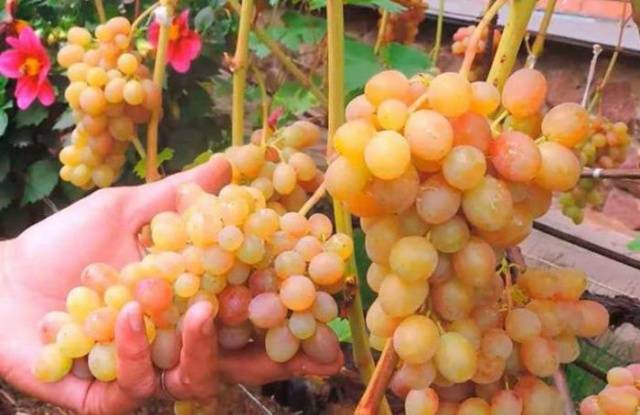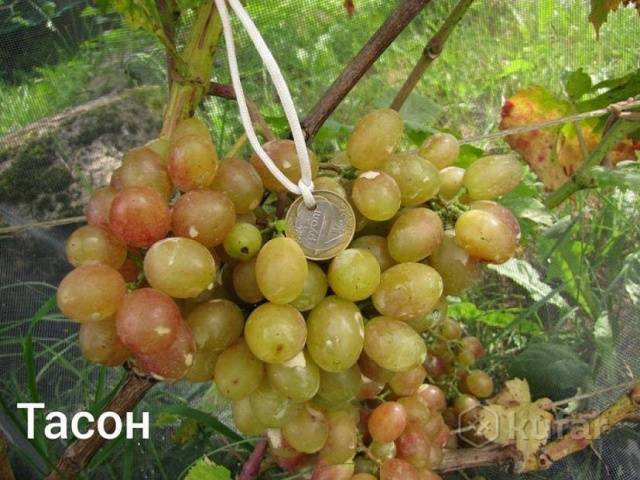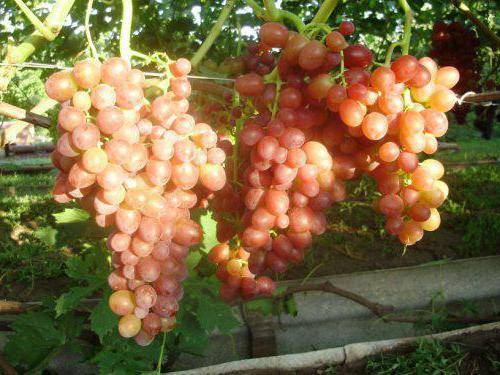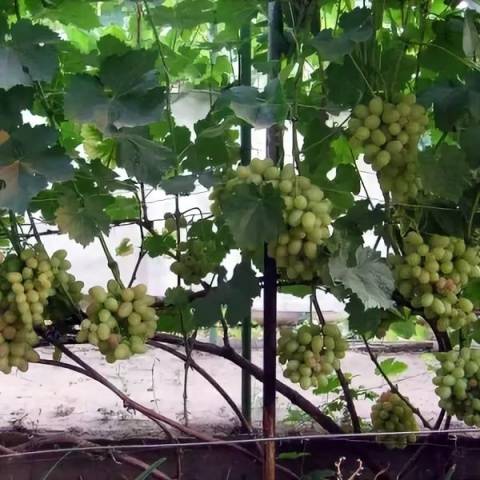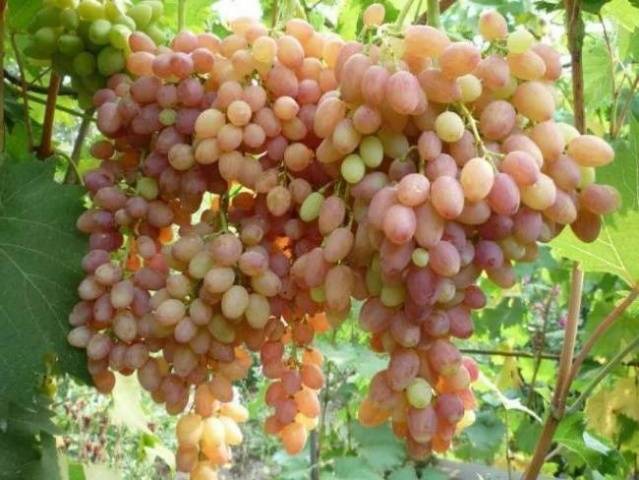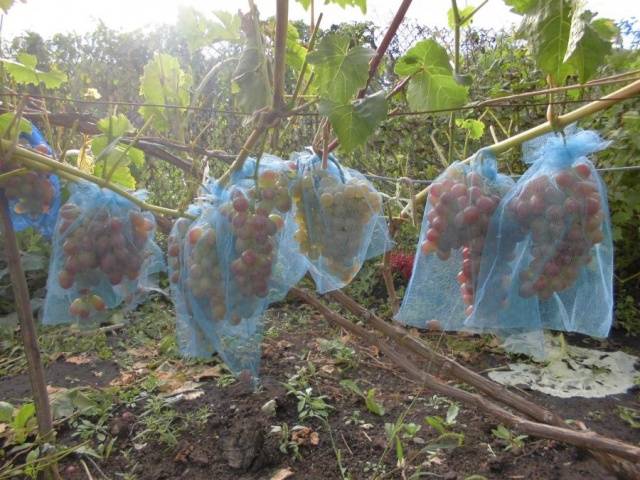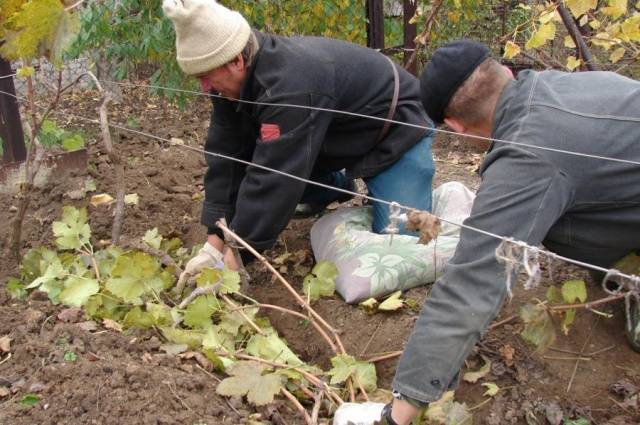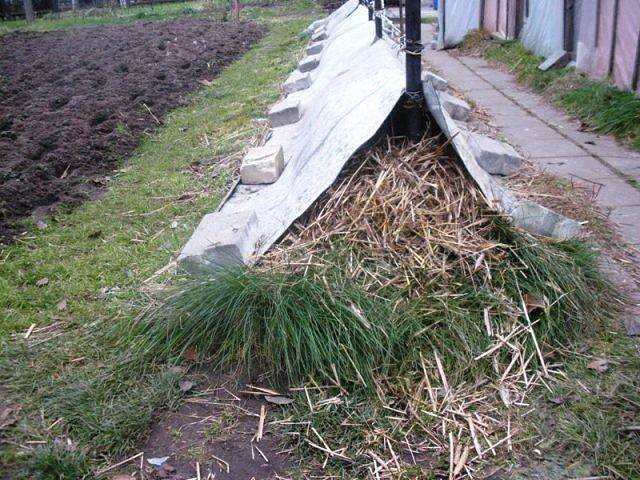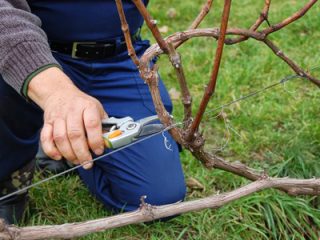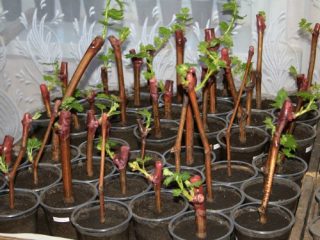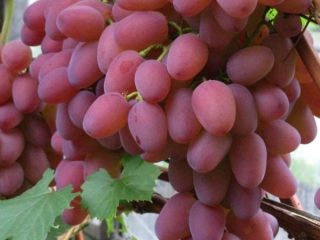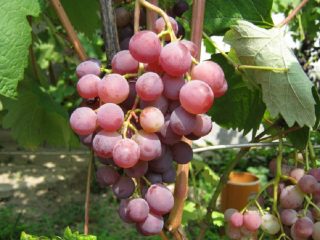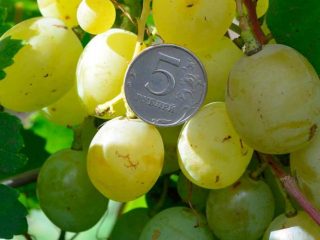Content
In recent years, more and more amateur gardeners are trying to grow grapes even in regions with risky farming. The main thing is to choose the appropriate grape variety, taking into account the ripening and frost resistance. Today, even in the Leningrad region, Tason grapes are grown.
Of course, you should not buy seedlings only by the description of the variety or photo, without knowing the characteristics. We will provide a detailed description of the variety, photos and gardeners' reviews in one article. We will also tell you about the features of cultivation and care. Just look at how delicious the Tason grapes look in the photo.
Description of grapes
Let's start the story about the Tason grape with a description of the variety and presentation of a photo.
The variety is hybrid, the parents are the varieties Italy and Zorevoy. In the taste and aroma of Tason grapes, notes of fresh strawberries and May honey are felt. The variety is mid-season, the bunches ripen in 100-110 days.
Bushes
The Tason grape variety is represented by a vigorous and voluminous bush with dark green leaves. Strongly dissected leaf plates have 5 lobes. Flowers are bisexual, do not need additional pollination. The berries are tied all over the hand.
Berries
The bunches have a cylindrical-conical shape, the weight ranges from 500 to 800 grams. According to gardeners' reviews, Tason grapes have their own record holders - brushes weighing up to 1 kg 200 grams. The length of the berries shining in the sun is 25 cm, the width of the fruits is about 18 cm. Almost all berries, weighing about 6 cm, are of the same size. Polishing in the hands is practically not observed.
Tason grapes (description, photo, reviews of which our readers are so interested in) - juicy, with crispy flesh. Although the skin is harsh, it is practically not felt when eaten, as well as small seeds.
At the beginning of ripening, the clusters are greenish-yellow. In technical ripeness, the berries acquire a pink or amber hue. It should be noted that in the shade the bunches tan poorly, the coloring is not so intense. Bushes of the Tason variety at the time of ripening look attractive, attract eyes.
And this is not surprising, because for the sweet-nutmeg taste it takes a rather high place - 8.2 out of 10 votes.
Characteristics
- Tason grapes, according to the description and reviews of gardeners growing this culture, are frost-resistant, withstands temperatures up to -22 degrees.
- The bunches ripen together and are kept fresh for a long time.
- If you cannot harvest right away, you do not have to worry, because even overripe berries do not crumble and do not lose their shape.
- Gardeners in the Tason variety (judging by the reviews) are attracted by a stable yield, even in a rainy summer.
- The berries make a delicious wine with a nutmeg aroma.
Speaking about the positive properties of grapes, it should be noted that the variety has some disadvantages:
- thick skin that not everyone likes;
- high susceptibility to powdery mildew, powdery mildew, mildew, but gray rot is practically not affected;
- aphids and wasps are the main pests.
These disadvantages can be easily dealt with if you take proper care of the vine. In addition, in many reviews, our readers disagree with the opinion about grape disease.They note that due to early maturation, diseases do not have time to develop.
Growing and care
As we have already noted, the cultivation of Tason grapes can be practiced in regions with different climates, caring for it is not burdensome. Even in a short summer, he manages to ripen. There is only one caveat regarding the northern regions - the planting of grapes should be planned from the southern or southeastern side. Important! Tason grapes are a sunshine lover, otherwise the berries will not tan, but will be whitish-green.
Grapes are demanding for systematic feeding and regular watering. But you do not need to fill the vine, this can provoke rotting of the roots.
You can propagate grapes of the Tason variety by cuttings, layering, shanks and seedlings from the nursery.
Diseases and pests
Any grapevine, including the Tason variety, can be susceptible to diseases, it is also attacked by pests. Although grapes are immune to some fungal diseases, such as gray rot. But mildew, oidium may well develop, especially if the vineyard is large.
Thanks to the timely treatment of grapes with antifungal drugs, problems can be avoided. But for this you need to monitor the condition of the vine. The slightest changes should be alarming.
In the fall, when the leaves fall off, they must be collected and burned. After all, they can contain disease spores and pests that have settled down for the winter.
The sweet, aromatic fruits attract wasps and birds. Therefore, if you do not want to lose the crop, at the very beginning of ripening, it is advisable to put on a gauze bag on each bunch, and throw a fine-mesh mesh on top of the bushes.
Preparing the vine for winter
Every grower knows that a stable yield depends on the health of the vine, its preparation for the next fruiting in autumn.
Tason grapes, if not grown in the south, need shelter for the winter. In order for the wintering to be successful, the vine must be prepared. What is the autumn care of Tason grapes:
- After all the bunches have been removed, the vine must be disinfected with special preparations for spores of fungal diseases. Most often, the treatment of vines and soil is carried out with a 5% solution of copper or iron sulfate.
- Pruning in the fall is also needed. It is carried out with the onset of the first frost. Previously, it is not advised to carry out the procedure, because the plant after fruiting needs to gain strength for wintering.
- Leaving in the winter on Tason grapes is necessary only for ripe shoots, the thickness of which is from 10 to 15 mm. Usually up to 14 eyes are left. Shoots that appear in the summer must be cut out, since they are not ready for wintering. Heavy pruning in the fall is not recommended, because winter is ahead, you always need to be on the safe side.
- The processed and trimmed vine is removed from the trellis and bent to the ground. So that it does not rise, it can be fixed with metal brackets or arcs.
- The vine is laid on a pillow of straw, leaves or spruce branches. To prevent mice from gnawing the grapes in winter, poison is poured onto the soil. What does such a bedding give: in winter air circulates freely in it, there is practically no damping out.
- Spruce branches, non-woven material are also thrown on top, the edges are sprinkled with earth. Openings must be left at the ends for air circulation. Tason grapes are completely covered, especially in areas of risky farming, with the onset of persistent frosts, not lower than 5 degrees. Then a layer of earth up to 30 cm is put on top.
With the onset of warm spring days, the shelter from the Tason grape vine is removed, but there is no need to rush. As gardeners write in reviews, spring return frosts can destroy the vine.
